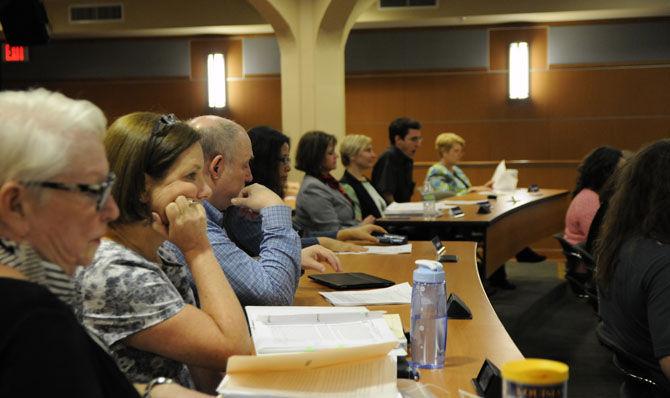A resolution expressing no confidence in members of the Faculty Senate Executive Committee and several resolutions regarding COVID-19 were hot topics at the Faculty Senate meeting on Oct. 28, where raised voices and high spirits greeted attendees.
No Confidence
Resolution 21-08, “An Expression of No Confidence in Selected Members of the Faculty Senate Leadership,” was sponsored by six faculty members and quickly gained popularity among professors. The resolution targeted faculty senate President Mandi Lopez, Vice President Joan King and past President Kenneth MicMillan. Daniel Tirone, a political science professor and one of the sponsors, led the conversation.
The complaint stems from the Board of Supervisors’ attempt to abolish the faculty council in September, a move that some say was in retaliation for the faculty council’s COVID-19 activism last summer. In May, over 600 members of the faculty council, which had not been convened since 2005, met and passed a resolution urging the administration to implement a vaccine mandate for the fall semester. The resolution passed with almost 90% in favor.
On Sept. 10, the Board of Supervisors proposed a motion to abolish one of the faculty’s two representative bodies, to be chosen at the discretion of the faculty. The council was the most likely to get the axe if the motion past, as it is not convened regularly. The Board of Supervisors set aside the motion after Bob Mann, a mass communication professor at LSU, made public comments accusing the board of silencing the faculty.
“This will cause national embarrassment for a university whose reputation is already at a low ebb because of the way this board responded to last year’s Title IX scandal,” Mann said. “If you vote to abolish the faculty council, you will not silence the faculty.”
Emails circulated by Tirone showed that Lopez knew of the Board of Supervisors’ intent to disband the faculty council but did not alert the faculty senate.
Lopez, in response, said that when she read the email informing her of the Board of Supervisors’ plan, she did not “think much about it.” She also said she was not aware it was on the agenda for the next meeting. When Tirone pointed out that the date the proposed changes would be discussed was clearly stated in the email, Lopez replied “well, I must not have read it very carefully.”
Marwa Hassan, a construction management professor and secretary of the FSEC, spoke in Lopez’s defense.
“She works diligently for so many hours, fighting for the faculty,” Hassan said.
Not all members of the FSEC support Lopez, however. Inessa Bazayev, a music professor and member-at-large of the faculty senate, stated that she supports the resolution.
“What was left out is that we were told by the president that there’s nothing we could do, the Board of Supervisors has made up their mind,” Bazayev said, referring to Lopez.
The resolution was tabled until the next meeting, but not before several faculty members exchanged heated words about Tirone’s circulation of email correspondence.
John Miles, the curator of books and head of instruction for LSU Libraries, raised concerns that his emails were included in the packet handed out by Tirone. Miles said he had more cause to be concerned than others, as he is untenured.
“There is a chilling effect to that, whether you redact my name or not,” Miles said.
Tirone retorted that faculty should not have the expectation of private emails at a public university.
“I would suggest that our orientation to our email should be that they should always be considered that they can be public at any time to our employers, to our students, to the family of our students, to the Louisiana legislature,” Tirone said.
Misinformation
Resolution 21-09, “Correcting LSU’s Misquotation of the FDA’s Vaccine Letters,” was sponsored by Charles Delzell, a mathematics professor. The resolution raised concerns that LSU uses “Pfizer vaccine” as a general term, and that continuing to “reference “the” Pfizer COVID-19 vaccine give[s] the impression that there is only one Pfizer COVID-19 vaccine, when in reality there are two: 1. ‘Comirnaty (COVID-19 Vaccine, mRNA),’ and 2. ‘Pfizer-BioNTech COVID-19 Vaccine.’”
Comirnaty is the branded name for the same vaccine. In terms of what is contained in the vial, they are identical, according to the FDA.
The resolution cites several documents in support of Delzell’s claims, but the resolution’s understanding of the documents is faulty.
One section of the resolution makes reference to a document from the Louisiana Department of Health, specifically quoting a portion that says “The Pfizer-BioNTech COVID-19 Vaccine has not been approved or licensed by FDA.” The document, however, is actually referring to the vaccine’s use in individuals aged 12-18. For this age group, the vaccine has Emergency Use Authorization, but not full FDA approval.
Several senators were not impressed with the resolution.
“I’ve heard about this the first time from a conservative radio host. They’re trying to shoot down the validity,” one senator said.
Several concerned LSU parents attended the meeting in support of Delzell’s resolution and registered public comments against a resolution to bring LSU’s vaccination policy into conformity with state and national guidelines.
“Why would any rational educated person be making this argument other than for political reasons? You want to do some more testing? How about test for natural immunity and leave our students alone,” said Valerie Gibson, who has a daughter at LSU.
Several of the parents who opposed COVID-19 mitigation efforts have been active elsewhere on campus, including attending Turning Point USA’s “Freedom Rally,” where several individuals spoke in opposition of LSU’s mask and vaccine mandates.
All resolutions discussed at the meeting were tabled and will be picked up at the next meeting on Nov. 15.
Faculty members propose resolution of no confidence in Faculty Senate leadership
October 31, 2021
Various members of the LSU faculty sit in on the Faculty Senate Meeting held on Tuesday, Oct. 6, 2015 in the Capitol Chamber of the LSU Student Union.






